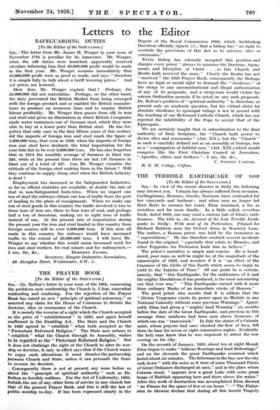THE PRAYER BOOK
[To the Editor of the SPECTATOR.] Sut,=-Dr. Relton's letter in your issue of the 10th, concerning the, problems now confronting the Church is, I fear, somewhat misleading and confusing. For the rejection of the Prayer Bonk has raised no new " principle of spiritual autonomy," or asserted any claim for the House of Commons to dictate the doctrine, rites or ceremonies of the Church.
It is merely the exercise of a right which the Church accepted as .the. price of " establishment " in 1662, and again herself .i.eaffirmed in the Enabling Act.. The State and the Church in 1662 agreed to " establish " what both accepted as the tl.Protestant Reformed Religion." The State now refuses to -" establish " what the Church through its Assembly, wishes to be regarded as the " Protestant Reformed Religion." But it does not challenge the right of the Church to alter its wor- ship or doctrine, it only in effect says that if the Church wants to enjoy such alterations it must dissolve the partnership between Church and State, unless it can persuade the State to-reverse its decision.
Consequently there is not at present any issue before us about...the " principle of spiritual authority " such as Dr. Relton so forcibly outlines. For the Act of Uniformity, 1662, forbids the use of any other form of service in any church but that of the present Prayer Book, and this is still- the law of public, worship to-day, It has been expressed clearly in the
Report of the Royal Commission 1906, which Archbishop Davidson officially signed, that a bishop has " no right to override the provisions of this Act as to services, rites or ceremonies."
Every bishop has solemnly accepted this position and charges every.priest " always to minister the Doctrine, Sacra- ments and Discipline of Christ . . . as this Church and Realm hath received the same." Clearly the Realm has not " received " the 1928. Prayer Book, consequently the Bishops have no legal or moral right to demand the " obedience " of the clergy to any unconstitutional and illegal authorization of any of its proposals, and a clergyman would violate his solemn Ordination promise if he acted on any such proposals. Dr. Relton's problem of " spiritual authority " is, therefore, at present only an academic question, but his virtual claim for absolute obedience to episcopal rulings is not in accord with the teaching of our Reformed Catholic Church, which has not rejected the infallibility of the Pope to accept that of the Episcopate.
We are certainly taught that in subordination to the final authority of Holy Scripture, the " Church hath power to decree rites and ceremonies " (Art. XX.), but the "Church " as such is carefully defined not as an assembly of bishops, but as a " congregation of faithful men " (Art. XIX.) which would comprise like the First Christian Council at Jerusalem, " Apostles, elders and brethren."—I am, Sir, &c.,


















































 Previous page
Previous page